
 |

|
|
|
|
Height: 5' 6" (1,68 m) Marriages: (1) Eileen Ann Detchon (Sep 1. 1940 - Feb 4. 1985, her death). Sons: Christopher Thomas, TV producer (Aug 31. 1942 - ), Charles Timothy, attorney (May 2. * 1944 - ) (as actor aka Charley Morgan), and the twins, Paul Anthony, attorney (Dec 23. 1946 - ) and Daniel Howard (Dec 23. 1946 - Nov 15. 1989) (2) Marcella Barbara Bushman Quine (Dec 17. 1986 - 2011, his death) Siblings: Arnold Leonald (Feb 27. 1919 - Jan 4. 2001) Marguerite Marie (Apr 16. 1924 - Sep 22. 2007) |
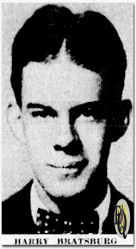 |
|
Above right: A photo of Harry Bratsburg
in a newspaper clipping (April 1932) announcing the Muskegon High
Debaters Win (in front of a crowd of 6000!). "Individual gold watches
will be presented by the Free Press to the two team members in the final debate." |
|
|
Harry was born in Detroit, Michigan, on April 10. 1915, as Harry Bratsberg, the son of Hannah
Christine Hanson*** and Henry Arnold Bratsberg, a mechanic, who were of Swedish and
Norwegian ancestry. His father and 2 uncles worked on the
Erie Canal. His father also worked at a factory in Detroit where
Eddie Rickenbacker produced his car. Wanting to become a lawyer, his specialty was debating and in his junior year he and and fellow debaters went all the way to a state championship, defeating Oxford in the finals at the University of Michigan campus in Ann Arbor (Apr 29. 1932). Young Harry was a popular classmate, being named class president in his senior year (1933). He played varsity football despite his small stature. He played a part in Clare Kummer's play Rollo's
Wild Oat and he demonstrated a knack for drama
during the annual student variety show, recounting a tale that likely veered
into fiction. Donned in a trench coat and galoshes, he regaled the audience
with a supposed conversation he had with Mata Hari's husband. Through his
public speaking and debating classes, Morgan apparently realized what assets
he had in his strong (and distinctive) voice and his presence. So in 1935 he joined the sales dept. at Shaw-Walker Company and was send to Washington D.C. He was selling (or not selling, as he clarified) office equipment making $20 a week selling office supplies, in 1937. "I only made $10 a week as an actor" he recalled bitterly, "and the week after I quit my job a fellow I was working with made $200,000 - selling all the filing cabinets to the Social Security office." He auditioned for the Washington Civic Theatre. "Because I was lonesome, just at night for something to do". He first performed there in the play The Front Fage (1936) with Charley Barry (who later became the head of NBC) at the then Wardman Park Theater (now Sheraton Washington Hotel). The director for the plays, Day Tuttle (together with Richard Skinner), also owned two summer stock companies "The Country Players" in Westport, CT and "Westchester Players" in Mt. Kisco, New York. The two companies, which had many of the Civic Theatre members alternated between those locations. |
|
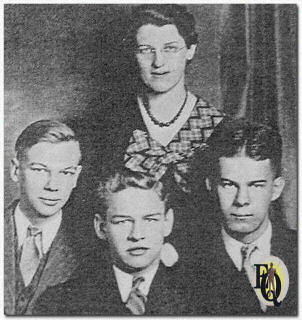 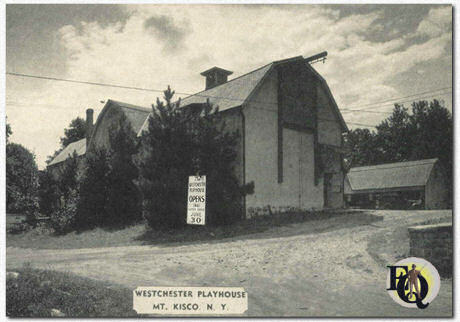 Above left: The Muskegon High debating team that won a state championship in 1932 - coached by Ms. Frances Thomas, including (L-R) William Shorrock, Kenneth Dryer, and Harry Bratsburg. Above right: What was once a stucco barn became the Westchester Playhouse, where many of Hollywood’s A-list actors perfected their craft. (Mt. Kisco, New York, 1941) Click on picture for larger version ... |
|
|
So together with
Frances Farmer and Mildred Natwick, he performed alongside her for the first time in the
companies' At Mrs. Beams, followed by roles in The Virginian
(Aug 1937), starring Henry Fonda. For the latter one critic wrote: "Mr.
Harry Bartsburg, as the villain, gave the only outstanding performance of
the evening. He was right and sure of himself all through a long and boring
evening, and when it was his turn to be undone, as all bad villains have to
be in plays, and then killed, I felt that an outrage had been committed.
Here they were killing off the only player doing a good job. Fortunately
villains are generally done away with just a few minutes before the last
curtain..." Frances Famer helped him get an interview with The Group Theater, comprised of a great many of the finest dramatic talents ever in U.S. history: Clifford Odets, Howard Clurman, Elia Kazan, Lee J. Cobb, Sanford Meisner, John Garfield, Karl Malden. Morgan was accepted into the Group, and appeared in a very successful Odets play called Golden Boy (Belasco, Nov 4. 1937 - Jun 4. 1938), in which he played a boxer, Pepper White (he once had a nasty family dog by that name.) It played Broadway for a year and then about ten weeks in London (St.James's Theater, Jun 21. - Aug 1938), where the cast spent some time with Paul Robeson and met Winston Churchill. Upon their return the show went on the road to Chicago, Philadelphia, Detroit, Washington D.C., ... .A host of successful Broadway roles followed (always billed as Harry Bratsburg). Morgan also did summer stock at the Pine Brook Country Club located in the countryside of Nichols, Connecticut. In 1939 he briefly earned two salaries on Broadway, appearing in the first act of My Heart's in the Highlands (Guild Theatre, Apr 13. - May 1. 1939), and in the third act of The Gentle People (aka Quiet City, Belasco Theatre, Jan 5. - May 6. 1939). Tower of Light was a play by Robert Ardrey staged by Elia Kazan for The Group Theater, It featured Lee Cobb, Frances Farmer, Art Smith and Harry Bratsburg. This was the name for the try-outs of Thunder Rock (Mansfield Theater, Nov 14. 1939 - Dec 2 1939). Harry remained with The Group Theater until the group disbanded in early 1941 after playing The Night Before Christmas (Morosco Theater, Apr 10. - 27. 1941). Frances Farmer was from Seattle, where she had grown up with Eileen Detchon, another aspiring Broadway actress, the latter met Harry while working together in a William Saroyan play called My Heart's in the Highlands. They were wed on September 1. 1940 (the census in April '40 lists them as married) and Harry found work in small theater and in radio. Frances Farmer persuaded the newlyweds to relocate to the West coast. Morgan entered a difficult period - he did not work for five months. He had a sort of breakthrough in another Saroyan play called Hello, Out There!** (Lobero Theatre, Santa Barbara, Sep 10. 1941), a very charming one-act work with very few characters David Selznick was producing. Morgan played "Photo-Finish", a rapist in the jail of a small Texas town and Phyllis Walker (later aka Jennifer Jones) the jail cook. It was intended as a paring with another one-act work. Charlie Feldman one of the biggest Hollywood agents came to see that and offered to be his agent. He went along and one week later he had a contract with 20th Century-Fox Studios and a few years of security, with Harry appearing as Henry Morgan in a few dozen films, often as comedic character or a heavy — not much in between. |
|
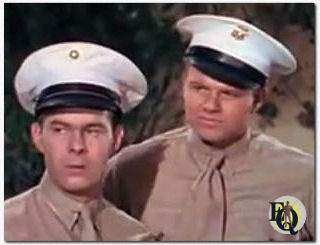 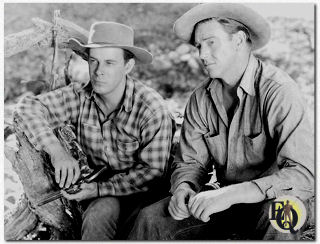 Above left: Morgan (L) made his screen debut (originally using the name "Henry Morgan") as contract actor in the movie To the Shores of Tripoli. (20th Century Fox, Mar 24. 1942) Above right: Harry Morgan (L) and Paul Langton (R) in Gentle Annie (MGM, Dec 1944). |
|
|
Upon his return to Muskegon, Michigan, his mother, Hannah Hanson, passed away in January 1942. Morgan made his screen debut (originally using the name "Henry Morgan") as contract actor in To the Shores of Tripoli (20th Century-Fox, Mar 24. 1942). His screen name later became "Henry 'Harry' Morgan" and eventually Harry Morgan. It was 20th Century-Fox that changed the actor's name to Henry Morgan. "Henry Morgan, in a sense, was a worse name than my own, Harry Bratsburg," said Morgan. "Everyone confused me with the popular radio comic. I decided to call myself 'Harry' Morgan." Press agent "Madman" Muntz had suggested his new name. Morgan became close friends with bandleader Glenn Miller (Morgan's son led the Glenn Miller Orchestra for a few years), whom he met while filming Orchestra Wives (20th Century-Fox, Sep 4. 1942), until Miller's death two years later. Later, Morgan would portray the role of pianist Chummy MacGregor in the 1954 film about his friend, The Glenn Miller Story. Morgan served in the US Army during WW2 where he
joined other actors making training films. One of his works, The
Rifle Platoon made in 1942 is available on YouTube. |
|
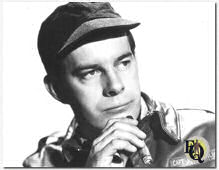 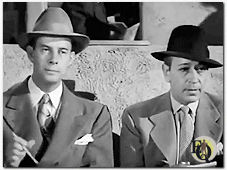 Above left: Harry Morgan in Johnny Comes Flying Home (1946) Above right: Harry Morgan and George Raft in Race Street (1948). |
|
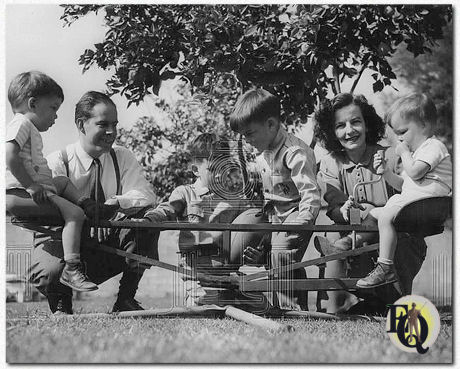 Above: Tough guy is family man: Harry Morgan, usually a tough guy in movies, is quite a family man. All his spare time is spent playing with fours sons in the back-yard playground of the Morgans' San Fernando Valley home. In the photograph, Harry and his wife give their twins a ride while two older sons discuss football. The twins are Danny (L) an Paul, in the other seat. Chris, 6 1/2 years old, holding the ball, and Timmie, 5, make plans for a catch. (1949) |
|
|
Morgan hosted the NBC radio series Mystery in the Air starring Peter Lorre in 1947. One memorable role was in the movie The Big Clock (Paramount, Apr 9. 1948) in which he plays a very menacing bodyguard/henchman to Charles Laughton. His lines were perfunctory and so he suggested that they just have the character be a mute — a touch that works very well. On the radio, he was heard in 1949 in the series Dragnet (NBC, August 18, 1949) and again as an obtrusive, alcohol-addled hotel clerk in the episode "The Big Boys" (NBC, 1950). This Is Your FBI (ABC-radio) had him in several episodes between September 1950 and May 1951. Seems strange that an actor with such a distinctive voice wasn't featured in more radio programs. Perhaps the other media offered more lucrative deals. Harry and his family lived in a ranch-type home in West Los Angeles and his hobbies included photography, horseback-riding, handball and bicycling. He also loves to cook and is a collector of fine symphonic music recordings. When television became an everyday reality in the '50s, Morgan was ready. |
|
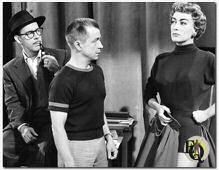 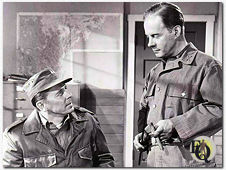 Above left: Harry Morgan, Eugene Loring and Joan Crawford in Torch Song (1953) Above right: Harry Morgan shown in a scene from the 1954 MGM movie Prisoner of War. He's about to send the actor (Ronald Reagan) on a dangerous mission behind communist lines in Korea. The M*A*S*H gang at 20th Century-Fox had fun with this photo! |
|
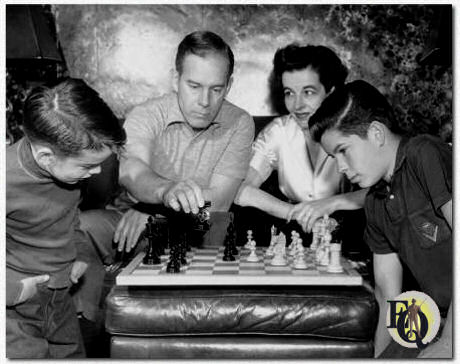 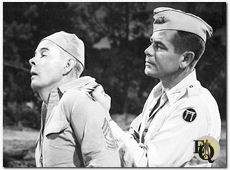 Above left: Harry Morgan playing chess with his wife Eileen and their sons. (ca 1955) Click on picture for larger version... Above right: Glenn Ford (R) grabbing Harry Morgan (L) in The Teahouse of August Moon (1956) |
|
|
The title of the sitcom December Bride (CBS-Desilu, 1954 - 1959), starring Spring Byington, referenced the single and available status of the show’s lead character, 60-something year-old Lily Ruskin. “Elderly” by societal standards then (and now), Lily refused to “act her age,” was as adventuresome, open-minded and independent as anyone even half her age. Morgan had a popular recurring role portraying Pete Porter, the next-door neighbor of the Henshaw family. Pete harbored disdain towards his mother-in-law and found his wife, Gladys, quite intolerable. Despite being frequently mentioned, Gladys never made an appearance. |
|
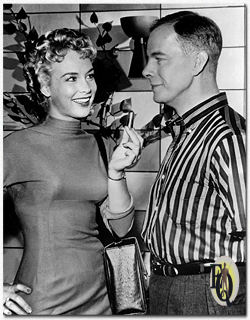 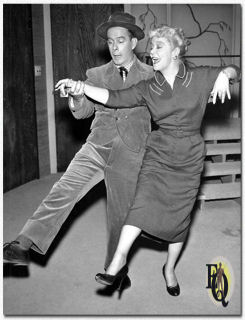 Above: December Bride (CBS-Desilu, 1954 - 1959) Left: Barbara Eden and Harry Morgan in the episode "The Other Woman", aired December 9. 1957. Right: Harry Morgan and Spring Byington (1958). |
|
|
Pete, portrayed by Morgan, garnered significant attention, leading to the creation of his own show titled Pete & Gladys (CBS, Sep 19. 1960 - Sep 10. 1962). It was in this series that Gladys, played by Cara Williams, was finally revealed on screen. The show was not nearly as successful as its predecessor. “Doing a TV series is about the same as pictures,” he told The Los Angeles Times in 1959. “The stage is more satisfying — except for the stomach. But I enjoy 'December Bride'. I look forward to doing each show. The people are enjoyable to work with. And Pete’s style of of humor is pretty close to my own.” Later he would contrast the two series, by telling the El Paso Herald-Post, “'December Bride' was a pleasant and wonderful association. 'Pete and Gladys,' not so pleasant.” |
|
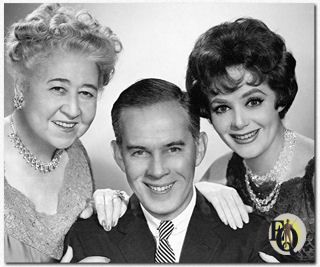 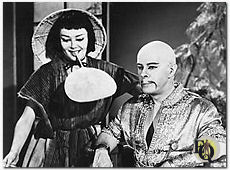 Above left: Promotional photo for Pete and Gladys (1960) with (L-R) Verna Felton, Harry Morgan, and Cara Williams. Above right: Pete (Harry Morgan) dreams of himself as an Oriental potentate with Gladys (Cara Williams) waiting on him hand, foot, and mouth in "No Man for Japan" on Pete and Gladys (CBS, Dec 12. 1960). |
|
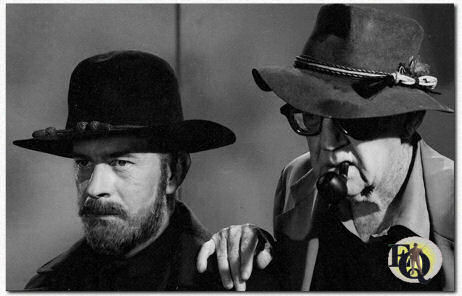 Above: Harry Morgan as general Sherman in a candid photo with John Ford director of How the West was Won (1962). |
|
|
Henry (NBC, Sep 24. 1963 - May 31.
1964) was among 11 repertory players on The Richard Boone
Show ending up also directing an episode (NBC,
"The Occupational Hazard", Feb 25. 1964). He also directed two
Alfred Hitchcock Hour episodes, "Who needs an enemy?"
(May 15. 1964) and "The World's
Oldest Motive" (Apr 12. 1965).
He would go on, from time to time, to
direct a few episodes in various series, including about nine later in M*A*S*H
. In 1964, he co-starred with Dennis Weaver in the series Kentucky Jones. (NBC, Sep 19. 1964 - Apr 3. 1965) He was an active opponent of the anti-communist campaign in Hollywood. Enjoyed golfing, traveling, dining, fishing, spending time with his family, reading, raising quarter-horses, horseback riding, animals, painting and poetry. In 1966 Harry played opposite Elvis Presley in Frankie and Johnny (below left), for Ellery Queen fans the picture has more familiar cast members: Eddie Quillan as cashier (uncredited) and the "faux" Robert Strauss. Between 1967 and 1970, Harry took on the role of Officer Bill Gannon in no fewer than 98 episodes of the iconic series Dragnet. In The Jerry Lewis Show, he and Jack Webb reprised their Dragnet roles in 2 episodes (NBC, 1967 and 1968). His recently purchased "hideaway home" near Santa Rosa, California, already needed all the window glass because of an earthquake (1969). He received the Gold Award of Purple Heart Veterans Rehabilitation Service in the 1970s. |
|

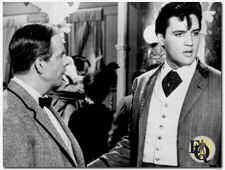 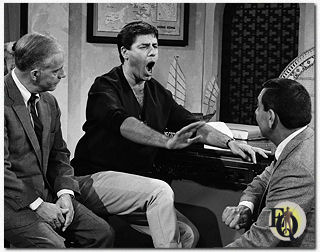 Above left: Harry Morgan and Elvis Presley in Frankie and Johnny (Edward Small, Mar 31. 1966) Above right: Episode 2 of The Jerry Lewis Show (NBC, Sep 19. 1967) with Harry Morgan and Jack Webb. |
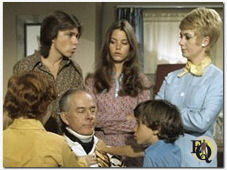 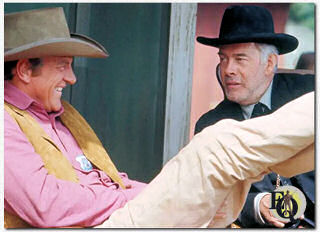 Above left: Harry Morgan with The Partridge Family in "The Sound of Money" (Screen Gems, Oct 2. 1970). Above right: Harry Morgan together with his best friend James Arness on Gunsmoke (ca. 1970). |
|
Morgan appeared on several famous TV-shows including The Partridge Family (1970 and 1972) and Gunsmoke (CBS, Nov 23. 1970 - Feb 10. 1975). In Ellery Queen Don't Look Behind You (Universal, Nov 19. 1971) Peter Lawford played the title role and Morgan, well-suited as the long-suffering Dad, Inspector Queen, was rewritten as a long-suffering uncle. Thus resolving not only the difference in accents between the two actors, but also the small age difference. |
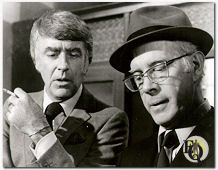 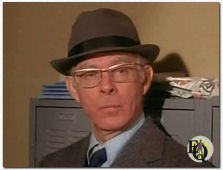 Above: Peter Lawford as Ellery Queen with Inspector Queen played by Harry Morgan in Ellery Queen, Don't Look behind You (1971). |
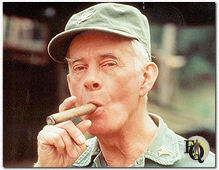 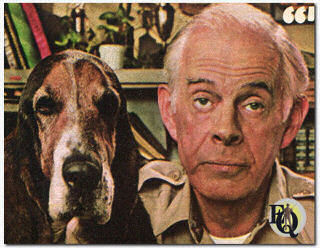 Above left: Col. Potter was a heavy drinker and a smoker, as was Morgan, in real-life. Above right: 1980 Print Ad of Gaines Complete Dog Food with Harry Morgan. |
|
Morgan's biggest role was that of a tough-talking,
commanding, fun-loving, serious Army Officer, "Col. Sherman T. Potter"
on M*A*S*H (20th
Century Fox, 1974 - 1983), when he replaced
McLean Stevenson, who left the show to unsuccessfully star in his own
sitcom. For the third time, the show was still a hit with fans, and at
60, he was nominated for Emmys eleven times and won his first and only
Emmy in 1980, for Outstanding Supporting Actor in a Comedy or Variety or
Music Series. By 1983, M*A*S*H's
series was getting very expensive, as well as with the cast, hence, CBS
reduced it to 16 episodes. Despite M*A*S*H's finale in 1983,
Morgan went on to star in a short-lived spin-off series After
M*A*S*H
(1983), co-starring Jamie Farr and William
Christopher, from the original M*A*S*H
series, without series'
star Alan Alda. (1) In a business in which friendships / often end at a series wrap party, Morgan is pleased to have an important carry-over from the M*A*S*H - days. "Loretta Swit called me from London," Morgan once said on the day before Christmas. "I think she's probably my best friend. She didn't even call collect" (Loretta lived next door to him). |
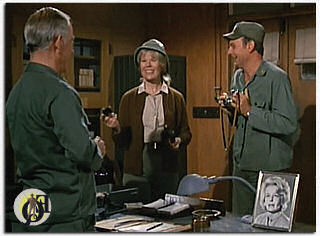 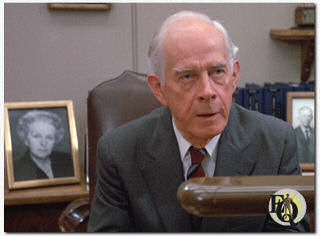 Above Above right: Morgan repeated this gimmick years later in the movie Dragnet (Universal, Jun 16. 1987) (with a photo of himself and Jack Webb on the other side). |
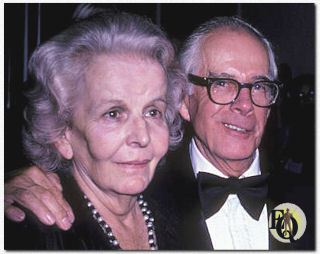 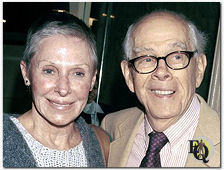 Above left: Eileen Morgan (L) and her husband actor Harry Morgan (R) at the 33rd Annual Emmy Awards - September 13. 1981 at Pasadena Civic Auditorium in Los Angeles. Above right: Harry Morgan and his wife Barbara at a banquet April 4. 2001 in Los Angeles, CA. |
| Eileen died in 1985. He then married Barbara Bushman Quine (above right), granddaughter of silent film star Francis X. Bushman) on December 17. 1986. The marriage lasted until his death. In July 1997, Morgan was charged with abusing his wife a year earlier, an argument that began during a dinner party earlier in the evening continued when the couple returned home, then turned violent leaving her with injuries to her eye, foot, and arm. Prosecutors dropped the charges after the 82-year-old actor completed a six-month domestic violence counseling program (2). |
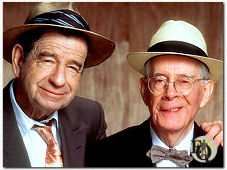 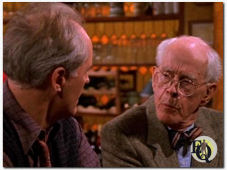 Above left: Harry Morgan (R) together with veteran Walter Matthau (L) in a publicity shot for the TV movie Against her will (PGP, Jan 29. 1992). Above right: With John Lithgow in 3rd Rock from the Sun (1996). |
|
Towards the end of his acting career, as he reached 80, he had a recurring role as the older college professor on 3rd Rock from the Sun (Carsey-Werner, 1996 - 1997), opposite John Lithgow (see picture above right). Soon afterwards, he retired from show business and lived with his family. His latest appearance on television was in the M*A*S*H: 30th Anniversary Reunion in 2002. Was inducted into the Hall of Great Western Performers at the National Cowboy & Western Heritage Museum in 2006. |
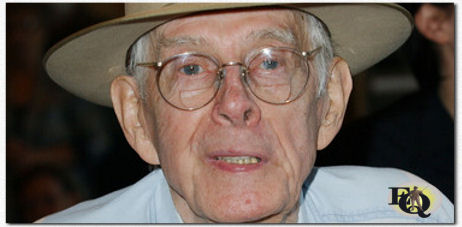 |
|
Morgan died peacefully in his sleep at 3:00 am in Los Angeles, on December
7. 2011, 10 days before his 25th wedding anniversary, at the age of 96. His son, Charles, said he recently had been
treated for pneumonia. His body was cremated and his remains were
given to his family. Acting was so important a part of his life, and when he had been asked about people who wanted to become actors, he had one bit of advice he’d picked up somewhere: “I like to pass this along,” he said. “If you take a sledge hammer or a rock or a baseball bat, and even with that you cannot dissuade somebody from the acting profession, then he or she should go ahead with it. If they can be turned aside, they don’t belong in the business. Believe me, they’re going to run into some hard times.” (11) Following Morgan's death, Mike Farrell, who played B.J. Hunnicutt opposite Morgan in M*A*S*H, released a statement: "He was a wonderful man, a fabulous actor and a dear and close friend since the first day we worked together. As Alan [Alda] said, he did not have an unadorable bone in his body. He was a treasure as a person, an imp at times, and always a true professional. He had worked with the greats and never saw himself as one of them. But he was. He was the rock everyone depended on and yet he could cut up like a kid when the situation warranted it. He was the apotheosis, the finest example of what people call a ‘character actor’. What he brought to the work made everyone better. He made those who are thought of as ‘stars’ shine even more brightly. The love and admiration we all felt for him were returned tenfold in many, many ways. And the greatest and most selfless tribute to the experience we enjoyed was paid by Harry at the press conference when our show ended. He remarked that someone had asked him if working on M*A*S*H had made him a better actor. He responded by saying, 'I don’t know about that, but it made me a better human being.' It’s hard to imagine a better one." (2) |
|
Notes: * May 1st is also mentioned frequently. However, in the article "Harry Morgan Ends Confusion," it states, "Timothy was 7 years old May 2." (Buffalo Evening News) ** IMDb has a listing for a 1949 movie Hello Out There with Harry Morgan produced by Huntington Hartford, who cast his future wife Marjorie Steele in the Jones part. The rapist became a gambler... It was never released and there is no known surviving print (according to the UCLA Theater Arts archive). *** aka Johanna Kristina (Hansdottir) Bratsberg All dates for movies are for the first US release. All dates for TV programs are original first airdates. All dates for (radio) plays are for the time span the actor was involved. Facts in red still need confirmation. |
|
Click on Uncle Sam if you think you can help out...!
|
|
Other references
Additional video & audio sources
|
|
This actor profile is a part of
Ellery Queen a website on deduction.
The actor above played Richard Queen in
the
Ellery Queen TV pilot. Click Uncle Sam if you think you can help
out...! Many of the profiles on this site have been compiled after very careful research of various sources. Please quote and cite ethically! |
|
Page first published on Dec 18. 2017 Version x2.1 - Last updated April 23. 2025 |
 b a c k
t o L i s t o f S u s p
e c t s
b a c k
t o L i s t o f S u s p
e c t s
|
|
| Introduction | Floor Plan | Q.B.I. |
List of Suspects | Whodunit? | Q.E.D. | Kill as directed | New | Copyright Copyright © MCMXCIX-MMXXV Ellery Queen, a website on deduction. All rights reserved. |